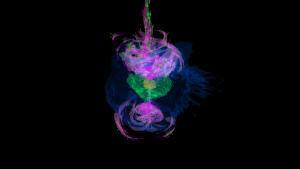Jürgen Ehlers Spring School on Gravitational Physics

© K. Hayashi, K. Kiuchi (Max Planck Institute for Gravitational Physics & Kyoto University)
organized by the Max Planck Institute for Gravitational Physics (Albert Einstein Institute).
The Max Planck Institute for Gravitational Physics (Albert Einstein Institute) offers a crash course on Gravitational Physics, General Relativity, Black Holes and Gravitational-Wave Astrophysics. This course can be attended by students studying from the 5th semester Physics or Mathematics.
The spring school will first introduce general relativity; we will then discuss black holes, gravitational waves, cosmology, quantum field theory, and quantum gravity. We will cover in particular the recent discoveries of merging black hole and neutron star. We also give insights into current research at the institute, both related to gravitational waves and beyond.
Lectures will take place daily during the morning. In the afternoons, we provide exercises and the opportunity for questions and discussions. We also plan two excursions to sights in the vicinity of Potsdam.
The Jürgen Ehlers Spring School takes place at the Max Planck campus in Potsdam. Potsdam is the capital of the state of Brandenburg and hosts multiple UNESCO World-Heritage Sites. It lies in close proximity to Berlin.
Information on how to get to the Max Planck campus in Potsdam can be found here.
Address
Max Planck Institute for Gravitational Physics
Am Mühlenberg 1
14476 Potsdam
Contact
Prerequisites
A working knowledge of introductory university physics (classical mechanics, electromagnetism), and mathematics (advanced calculus, linear algebra) will be assumed. Some prior exposure to differential geometry is desirable but not required.
Abstracts
Week 1: Introduction to General Relativity, the Theory of Black Holes, and Cosmology
The first week’s lectures will be devoted to the study of Einstein’s theory of General Relativity and the theoretical foundations for black holes. The lectures will be also devoted to Cosmology.
Week 2: Gravitational-Wave Astronomy and Quantum Gravity
This week will give an overview of gravitational-wave astronomy. Topics include the theory of gravitational waves and a discussion of the major astrophysical sources of gravitational waves, most notably inspiraling compact object binaries (i.e. black holes or neutron stars). We will also offer a lecture on quantum field theory and quantum gravity.
Schedule
Week 1: Introduction to General relativity, the Theory of Black Holes, and Cosmology
| Mon 26/2 | Tue 27/2 | Wed 28/2 | Thu 29/2 | Fri 1/3 | |
| 9:15 – 10:45 | General Relativity Sebastian Völkel | General Relativity Sebastian Völkel | General Relativity Sebastian Völkel | Black Holes Karim van Aelst | Cosmology Jean-Luc Lehners |
| 11:00 – 12:30 | General Relativity Sebastian Völkel | General Relativity Sebastian Völkel | General Relativity Sebastian Völkel | Black Holes Karim von Aelst | Cosmology Jean-Luc Lehners |
| Lunch | |||||
| 14:00 – 15:30 | Exercises | Colloquium Alberto Sesana | Excursion | Exercises | Exercises |
| 15:45 – 17:15 | Exercises | Excursion | Exercises | Exercises | |
| evening | Reception | ||||
Week 2: Gravitational-Wave Astronomy and Quantum Gravity
| Mon 4/3 | Tue 5/3 | Wed 6/3 | Thu 7/3 | Fri 8/3 | |
| 9:15 – 10:45 | Gravitational waves Elisa Maggio | Gravitational waves Elisa Maggio | Gravitational waves Elisa Maggio | Gravitational waves data analysis Héctor Estellés | Classical Gravity from Quantum Field Theory Gustav Mogull |
| 11:00 – 12:30 | Gravitational waves Elisa Maggio | Gravitational waves Elisa Maggio | Gravitational waves Elisa Maggio | Gravitational waves data analysis Héctor Estellés | Quantum Gravity Hermann Nicolai |
| Lunch | |||||
| 14:00 – 15:30 | Exercises with Elise Sänger | Supernova and neutron star formation Takami Kuroda | Excursion | Exercises | |
| 15:45 – 17:15 | Exercises with Elise Sänger | Excursion | Exercises | ||
| evening |
The excursions will go to the Einstein Tower in Potsdam and the Einstein summer house in Caputh.
Complementary Reading
Introduction to general relativity and the theory of black holes
- Bernard F. Schutz, A first course in General Relativity
- James Hartle, Gravity: An Introduction to Einstein’s General Relativity
- Ray D’Inverno, James Vickers, Introducing Einstein’s Relativity: A Deeper Understanding
- Kip S. Thorne, Roger D. Blandford, Modern Classical Physics, Volume 5 (Relativity and Cosmology)/ Part VII
- Michael Hobson, George Efstathiou, Anthony Lasenby, General Relativity (An introduction for physicists)
Gravitational waves
- Eanna Flanagan, Scott A. Hughes, S., The Basics of Gravitational Wave Theory
http://adsabs.harvard.edu/abs/2005NJPh….7..204F - • B. P. Abbott et al. (The LIGO Scientific Collaboration, the Virgo Collaboration), The basic physics of the binary black hole merger
GW150914 https://arxiv.org/abs/1608.01940 - • B. P. Abbott et al. (The LIGO Scientific Collaboration, the Virgo Collaboration), Observation of Gravitational Waves from a Binary Black Hole Merger,
https://arxiv.org/abs/1602.03837
https://journals.aps.org/prl/abstract/10.1103/PhysRevLett.116.061102
Cosmology
- Weinberg, S., Cosmology
Organizers
- Kenta Kiuchi
- Axel Kleinschmidt
- Jan Steinhoff


